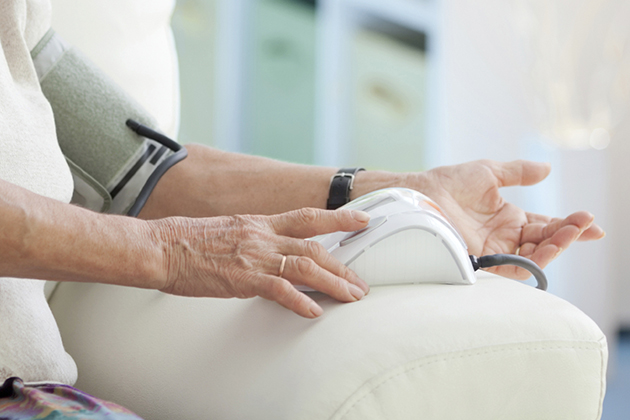
Could the aging process be slowed by aggressively managing an older person’s high blood pressure?
Researchers at UConn Health have found blood pressure to be a reliable predictor of the progression of what’s known as “white matter disease,” or small-vessel disease of the brain, which impacts the decline in cognitive function, mobility, and balance associated with aging. And they hope that better blood pressure management could help slow this progression.
But it goes beyond occasionally putting on a blood pressure cuff during a visit to the doctor’s office. The researchers are monitoring patients with hypertension around the clock, and using the data to tailor their therapy to help prevent loss of function.

“We’ve learned from prior research that there is an important relationship between out-of-office blood pressure – but not doctor’s office pressure – and the progression of blood vessel disease of the brain and its associated decline in function,” says Dr. William B. White, professor of medicine and chief of the Calhoun Cardiology Center Division of Hypertension and Clinical Pharmacology. “The program we’re doing now is actually evaluating interventions using 24-hour monitoring to guide the therapy that we hope will prevent the functional loss.”
Along the way, White, the immediate past president of the American Society of Hypertension, has made some incidental observations.
“We’ve found in a number of cases that the hypertensive patients joining this study were actually overmedicated,” White says. “We were able to bring their blood pressure under control by reducing their medications. The around-the-clock blood pressure monitoring provides us the crucial data that enables us to do this. More isn’t always better.”
Such was the case for Gerald Kehoe, who joined the study two and a half years ago. He recalls that he was having great difficulty controlling his hypertension.
“I came here because of Dr. White’s reputation, and I believed he could stabilize my blood pressure,” Kehoe says. “This [program] allows me to take my blood pressure over 24 hours and give Dr. White an idea of how my blood pressure changes during different times and events. That’s the way we learned how erratic our blood pressure is. Without that I don’t think they could regulate it fully.”
Kehoe says White reduced his medications and was able to stabilize his blood pressure.
Kehoe also persuaded his wife to join the study. Fran Kehoe’s improvement was less drastic than her husband’s – but she had less room for improvement.

Fran Kehoe says she is participating in order to help others: “If they can find out what caused the problem, they can save somebody else.”
She says she’s living proof of the difference clinical trials can make: As a cancer survivor, she is the beneficiary of someone else’s participation in past studies.
Gerald Kehoe says the study also has short-term benefits for the participants.
“I feel wonderful,” he says. “I really appreciate what the study has done for me, and I hope it will do the same for other people.”
Study participants receive blood pressure care and treatment, including medications, over a three-year period, during which they undergo a series of tests to measure mobility, cognitive function, and white matter hyperintensities, the signs of small vessel brain damage. Participants periodically wear an ambulatory blood pressure monitor for 24-hour duration.
The researchers, led by White and Dr. Leslie Wolfson, professor of neurology, are in the home stretch of recruiting study participants for what’s known as “The INFINITY Trial,” a multi-year, $3.4 million study funded by the National Institute on Aging, a division of the National Institutes of Health.
Those interested in joining or learning more about INFINITY, which stands for “Intensive Versus Standard Ambulatory Blood Pressure Levels to Prevent Functional Decline in the Elderly,” may call 860-679-2705. Study participants must be at least 75 years old, have a history of hypertension, and cannot have a history of clinical stroke or major neurologic disability. The doctors and project managers can determine potential eligibility through a simple phone interview.
Follow UConn Health on Facebook, Twitter, YouTube, and SoundCloud.


